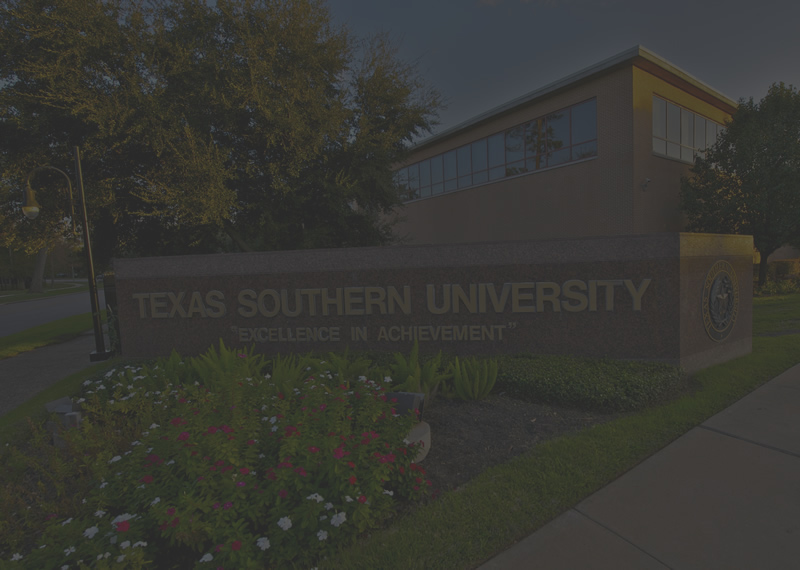Impact on Student Learning & Development
June 25 - 27, 2020
Call for Proposals
Texas Southern University’s College of Education/Center for Excellence in Urban Education invites you to submit a proposal for the 2020 Impact on Student Learning and Development Conference. The Conference will be held June 25-27, 2020 in Houston, Texas on the campus of Texas Southern University.
Key Dates and Deadlines:
- January 14, 2020 - Call for Proposals Opens
- March 6, 2020 - Call for Proposals Closes
- April 17, 2020 - Notification of Acceptance
- April 24, 2020 - Deadline for accepted presenters to return completed/signed presenter agreement
- May 22, 2020 - Deadline for presenter(s) to register to be included in the conference program book **Any presenter registered after this time will not be included in the conference program.
- June 12, 2020 - Deadline for presenters to submit electronic handout(s) to be posted to website
Before submitting your proposal, please read the entire Call for Proposals.
Conference Theme: Impact on Student Learning and Development
Conference Strands:
Counseling - The program committee is soliciting proposals for presentations promoting evidence-based programs in the domains of clinical mental health counseling, rehabilitation counseling or highlighting the latest techniques and practices in school counseling. Presentations showcase proven programs, current research, or skills of value to counselors, pre-K to postsecondary as well as district personnel, graduate students and counselor educators. We are particularly interested in sessions that emphasize technology in counseling. This is one of the components on which the submissions are being scored.
Curriculum and Instruction - The program committee is soliciting proposals for presentations promoting evidence-based programs or highlighting the latest techniques and practices in the domains of Reading Education, Special Education, Bilingual Education, Early Childhood Education, English, Mathematics, and Spanish. Presentations showcase proven programs, current research, or skills of value to pre-K to postsecondary as well as school administrators, district personnel, graduate students and higher education faculty.
Educational Administration - The program committee is soliciting proposals for presentations promoting evidence-based programs or highlighting the latest techniques and practices in the domains of Educational Administration and Supervision or Higher Education. Presentations showcase proven programs, current research, or skills of value to pre-K to secondary education and post-secondary education (higher education) as well as school administrators, district personnel, and graduate students.
Health and Kinesiology - The program committee is soliciting proposals for presentations promoting evidence-based programs or highlighting the latest techniques and practices in the domains of Health (Teaching and Non-teaching), Human Performance (Athletic Training-Teaching and Non-teaching), Recreation and Leisure Studies, Sport Management, and Health Studies. Presentations should showcase proven programs, current research, or skills of value to pre-K to secondary educators and post-secondary (higher education) faculty as well as school administrators, district personnel, graduate students, health educators, athletic trainers, recreation and leisure personnel and sport management personnel.
Session Formats:
The 2020 Summer Conference Planning Committee encourages formats that use multiple presenters, from higher education faculty (including undergraduate and graduate students), to classroom teachers, teacher educators at all levels, other school personnel (i.e. school and district administrators, counselors, etc.), mental health practitioners, behavioral and other health professionals, pastoral staff, and policy makers. The submissions collected from this Call for Proposals will be considered for the following formats:
- (A) - Concurrent Sessions - These sessions are to be interactive and designed to give participants specific skills and strategies related to the topic presented with emphasis within the four major conference strands. Sessions limited to 60 minutes.
- (B) - Roundtable Format - Roundtables discussions are informal sessions during which a presenter is seated at a table to discuss works-in-progress that may not be ready for formal presentation. Roundtable discussion facilitators are assigned to numbered tables in a large room. In the roundtable session, facilitators should allocate roughly equal time between discussion of their research and opportunities for questions from all session attendees. (Given the informal structure of the roundtable presentation, no audio-visual equipment will be provided). Sessions/Discussions limited to 60 minutes.
- (C) - Panel Discussion - Panel discussion provides an opportunity for public discussion amongst a selected group of panelists. Central to the success of a panel discussion is the choice of a good topic as the focus for discussion and panelists who bring differing perspectives and are confident in making clear arguments in a live situation. Panels should comprise of three (3) to five (5) scholars who present their arguments with discussants offering crucial comment to the arguments made. (Proposals must include and identify a facilitator/host to: a) convene and introduce the panelists and topic, b) serve as timekeeper, and c) provide concluding remarks. Discussion will be open to the participating audience. Sessions/Discussions limited to 60 minutes.
- (D) - Multiple Paper Format - This type of thematic session provides an opportunity for authors to present a synopsis of their work. The planning committee will group two-three papers of a related topic or theme for 90 minutes. Each paper will be given approximately 15-20 minutes to present, followed by a 10-15 minutes question-and-answer session.
- (E) - Poster Session - The Conference will showcase posters in a space that allows a large number of participants to engage with each poster presenter. Proposals for posters should focus on important and timely topics related to the conference tracks. Poster presentations are particularly useful for presenting emerging work and preliminary attempts, but may also be an excellent means of engaging in detailed dialogue about completed projects. Posters will be displayed during the conference, and featured during a poster session and reception. At least one author will be required to ‘attend’ the poster session in order to present and discuss the work with other conference delegates. (Should not exceed 72 inches wide by 42 inches tall). *(GRADUATE STUDENTS ONLY)
Guidelines for Authors (Multiple Paper Format Session):
- (I) - Style - Write clearly and simply in the third person for an audience of professionals from diverse fields. Avoid technical jargon and abbreviations. Define technical terms when they are introduced.
- (II) - Format - In general, follow the guidelines presented in the Publication Manual of the American Psychological Association (APA), 6th edition.
- (III) - Mechanics - Check your paper to ensure accurate spelling, grammar, and punctuation.
- (IV) - Copyrights and Reprints - Texas Southern University will hold the copyright for all articles published in Journal of Urban Education and Practice. Although no reprints will be provided, authors of accepted articles will receive permission to reproduce their articles as needed.
- (V) - Submission - Submit the paper via email attachment in Word for Windows to "CenterForExcellence@tsu.edu" No other form of submission will be accepted. Authors must also submit a completed proposal (see Proposal Submission Criteria). The deadline for all submissions is February 28, 2019. Please feel free to call if you have any questions.
- Presenters must be available on any day for which COE assigns your session.
- Proposal submission does not guarantee participation in the Impact on Student Learning and Development Conference.
- The Impact on Student Learning and Development Conference is a noncommercial forum. Under no circumstances may a breakout session be used as a place for direct promotion of a presenter’s product, service or monetary self-interest. Sales pitches disguised as presentations will not be considered.
Conference Information:
Registration Information - All presenters must pay conference registration fees and have a registration badge. Please explain this policy to your co-presenters. There are no presenter registration discounts available. We cannot pay an honorarium or expenses for presenting breakout sessions at the Conference, but hope that the intangible benefits of being a part of our educational programming make the effort worthwhile for presenters.
- Presenters not registered by April 12, 2020 WILL NOT be listed in the program book. Any presenters registered after that date will be listed in the conference program addendum.
- Persons presenting at the conference are expected to use material and language that does not discriminate on the basis of gender, race, color, ethnicity, religion, physical ability, and/or sexual orientation
- Texas Southern University - College of Education (COE) does not pay ANY honoraria, speaker fees, or travel expenses to pre-conference institute or breakout session speakers.
Submission Information
- The individual submitting the abstract is considered the primary contact.
- All information and correspondence regarding the Impact on Student Learning and Development Conference will be sent via email.
Preference will be given to the sessions that align with the Conference Strands
- Counseling
- Curriculum and Instruction
- Educational Administration
- Health and Kinesiology
Session Information
- Breakout rooms will be equipped with an LCD projector, screen, and head table for three. Internet access is provided in breakout rooms. Presenters should have 20 copies of handouts or materials for the attendees.
- Presenters agree to abide by the terms of the copyright release in order to present at the Impact on Student Learning and Development Conference. COE may take pictures, record audio and/or video presentations and make them available to members and other professional interested in the topic.
- Presenters agree to provide contact information for ALL presenters, including, name, address, phone number, and email address.
- Presenters agree to permit COE to provide their contact information to attendees upon request. Presenters understand that COE does not provide hardcopy handouts to attendees; it is the responsibility of the presenters.
COE Conference Policies
- If your proposal is selected, COE reserves the right to revise presentation titles, reassign the selected Strand, and/or edit the program summary for promotional and program materials.
- COE reserves the right to cancel a session based on noncompliance at any point. This includes, but is not limited to: failure to fully register, failure to return required documents, presenter changes, etc.
Proposal Submission Criteria
Proposals must be submitted to CenterForExcellence@tsu.edu, in electronic format as an attachment (Microsoft Word) by March 6, 2020. All Proposals must include the following (incomplete proposals will not be reviewed).
Cover sheet, to include:
- Title of Session/Presentation
- Targeted Strand: Counseling, Curriculum and Instruction, Educational Administration or Health and Kinesiology.
- Outcomes/Objectives of your session
-
For each presenter:
- Name and Title
- Institutional Affiliation/Organization
- Email address
- Mailing Address
- Phone Number
- Brief Biography (Up to 100 words each)
- Key contact person: name, phone number(s), and email address
- Abstract, 100 words or less, for conference program
Presentation proposal, 500-800 words, as a separate document void of identifying information (for blind review process)
General Information
- Information used in the program is copied from the proposal cover page. COE reserves editorial rights.
- All communication will be with Key Contact Person who is responsible for communicating with other presenters of that session.
- All proposals are reviewed by a team of COE and external reviewers. Each proposal is blind reviewed. Presenter(s) information is not supplied to the reviewer for any proposed session.
Some specific points considered in the proposal review process are:
- Is the title appropriate?
- Is the content current and relevant to the needs of today’s educational and health systems?
- Is the description clear and does it accurately reflect the proposed content?
- Are presentation outcomes/objectives measureable and achievable?
- Will the presenter(s)/ presentation provide new information, knowledge, skills, and/ or unique/ new applications of known information, knowledge, skills, etc.?
- Is the program format appropriate for the subject matter?
Questions?
For any questions regarding the Call for Proposals process, please contact:Mr. Jeffery Lindsey (Jeffery.Lindsey@tsu.edu)








